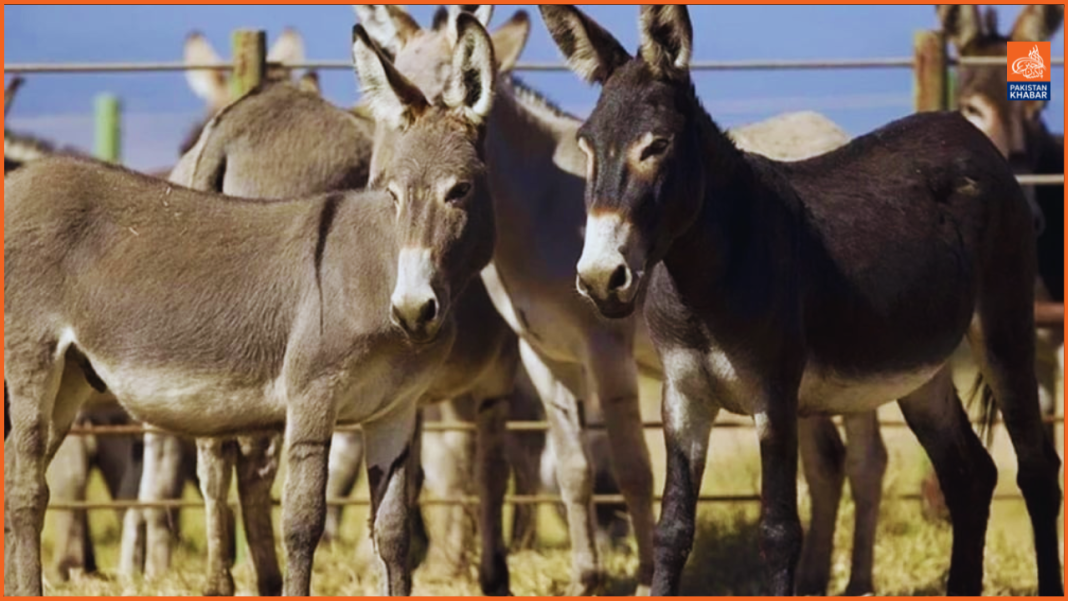Pakistan’s recent plan to export donkey hides and meat to China signifies an ambitious move into a unique market, aimed at addressing China’s rising demand for these products. This trade initiative involves exporting up to 216,000 donkeys annually to China, reflecting Pakistan’s commitment to strengthening trade ties with its key ally and enhancing export potential.
Finalized during Chinese Premier Li Qiang’s recent visit, this agreement is a major step forward in Pakistan-China relations. Supervised by China’s General Administration of Customs and Pakistan’s Ministry of National Food Security and Research, the arrangement sets out rigorous quarantine and quality protocols. The initiative is anticipated to generate substantial revenue and job opportunities within Pakistan, offering both financial benefits and employment growth for the rural economy.
Why China Wants Donkey Meat and Hides
Donkey meat is a staple in certain Chinese dishes, particularly in the “donkey burger,” popular in Hebei Province. Donkey meat has a long-standing culinary heritage in areas like Baoding, where it’s esteemed as a delicacy. A popular saying even claims, “In Heaven, there is dragon meat, and on Earth, there is donkey meat,” highlighting its cultural value. However, the hides are especially prized, as they produce Ejiao—a gelatin traditionally valued in Chinese medicine to support blood circulation and improve overall health.
The gelatin is derived by boiling and processing donkey hides and is thought to serve as a health tonic. Demand for Ejiao has driven China to import donkey hides from other countries, giving Pakistan—home to around 5.2 million donkeys—a unique opportunity to enter this market.
Economic and Employment Prospects
According to Pakistan’s Ministry of National Food Security and Research, the donkey farming and processing sector could see significant expansion to meet the increased demand from China. By encouraging donkey breeding farms, particularly in rural areas, the government aims to create sustainable employment and economic growth. Plans for specialized slaughterhouses are underway, with facilities expected in Gwadar and near Karachi to streamline processing and proximity to export routes. These facilities are also intended to minimize any impact on local markets.
This strategy aligns with the broader goals of the China-Pakistan Economic Corridor (CPEC) and the Belt and Road Initiative (BRI). Chinese investment groups, such as the Hangeng Group, are poised to invest in abattoirs within Pakistan’s Gwadar Free Zone. Standard Operating Procedures (SOPs) are being developed to govern production and processing, ensuring compliance with China’s health standards, and local donkey farms are currently undergoing certification for export readiness.
Growing Demand, Growing Prices
Pakistan’s move into donkey exports has already influenced local markets, with increased costs for donkey breeding and sales. Anticipation of strong profits has driven prices higher. Pakistan, which previously imported donkey hides from African countries for processing and resale, had to halt these activities after failing to meet specific compliance standards. By focusing on local production to meet this new demand, Pakistan aims to build a self-sustaining market, allowing for revenue growth while reducing dependence on external sources.
A New Trade Frontier
Pakistan’s venture into the Chinese donkey products market represents an evolution in international trade. By embracing this unique export strategy, Pakistan not only aims to boost its economic standing but also seeks to strengthen its diplomatic ties with China. The project also brings an influx of Chinese investment and expertise, fostering the growth of specialized donkey farms and slaughterhouses and marking a new chapter in Pakistan-China economic cooperation under CPEC.
The success of this initiative will rely on robust regulation, ethical practices, and consistent supply to prevent market saturation. This project could potentially serve as a model for other nations looking to adapt traditional sectors to emerging global demands. As Pakistan faces these challenges, this partnership may solidify Pakistan’s economic footing and underscores the dynamic evolution of international trade relations.




